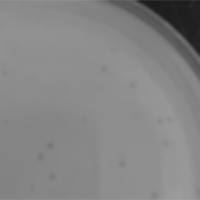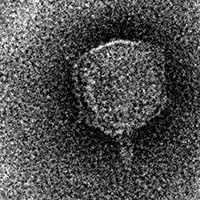Microbacterium phage Newbury


Know something about this phage that we don't? Modify its data.
| Detailed Information for Phage Newbury | |
| Discovery Information | |
| Isolation Host | Microbacterium foliorum NRRL B-24224 |
| Former names | Kilo |
| Found By | Kaitlyn Vo, Jada Gourdet, Rubi Ortega, & Ivy Tiet |
| Year Found | 2024 |
| Location Found | Amherst, Ma, MA United States of America |
| Finding Institution | University of Massachusetts Amherst |
| Program | Science Education Alliance-Phage Hunters Advancing Genomics and Evolutionary Science |
| From enriched soil sample? | No |
| Isolation Temperature | 30°C |
| GPS Coordinates | 42.3922 N, 72.52625 W Map |
| Discovery Notes | This phage was discovered right next the Hasbrouck Laboratory on the University of Massachusetts Amherst campus. This phage was found in a dry grassy area that did not have any mulch. There were leaves and sticks on the ground and trees surrounding the area. This phage was collected on 02/04/2024. |
| Naming Notes | We came up with the name of this phage because we wanted to name it after one of the group members' pets. This name also fits the phage naming rules. At first we weren't sure what we wanted to name the phage but we decided it would be good to name it after something we love, our pets. |
| Sequencing Information | |
| Sequencing Complete? | No |
| Genome length (bp) | Unknown |
| Character of genome ends | Unknown |
| Fasta file available? | No |
| Characterization | |
| Cluster | Unclustered |
| Subcluster | -- |
| Annotating Institution | Unknown or unassigned |
| Annotation Status | Not sequenced |
| Plaque Notes | After the first round of purification, there were some plaques that were small and others that were larger. There were some plaques that were in close proximity and others that were far apart from each other. The smaller plaques were about 1 millimeter long while the larger ones were about 2 millimeters long. After the second round of purification, the plaques were roughly the same length, about 1 millimeter long. There were few areas where the plaques were close together. On the 10^0 plate on the second round of purification, the plaques were very clustered together and made it difficult to see the plaque's morphology. For the most part each of the plaques were scattered. In both rounds of purification, the plaques were circular about 1-2 millimeters, and were clear in the middle. |
| Has been Phamerated? | No |
| Publication Info | |
| Uploaded to GenBank? | No |
| GenBank Accession | None yet |
| Refseq Number | None yet |
| Archiving Info | |
| Archiving status | Archived |
| Pitt Freezer Box# | 207 |
| Pitt Freezer Box Grid# | E10 |